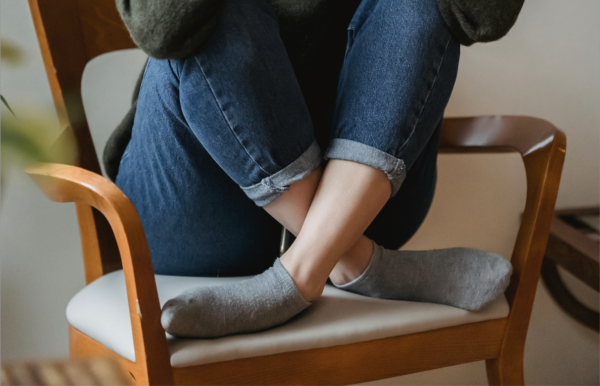Sleep is far more than rest. From a scientific point of view, it’s vital neurological maintenance.
While we sleep, our brains regulate mood, process emotions, consolidate memory, and restore balance to systems that affect everything from stress response to hormone function.
In short – healthy sleep helps us cope, connect, and carry on1. Therefore, it stands to reason that when sleep suffers, so too does our mental health.
Studies have shown that up to 90% of people living with depression experience sleep disturbances2. For some people, that means struggling to fall or stay asleep3. For others, it’s the opposite – sleeping excessively, yet never feeling rested. But, irrespective of the relationship, it’s clear that sleep and depression are tightly interwoven, and problems with one can often trigger or intensify the other.
However, this isn’t just a symptom of modern life. It’s a clinical reality. Rather than just a side effect of depression, disturbed sleep can be an early warning sign, a contributing factor, and a barrier to recovery if left unaddressed.
Are you living with sleep disturbances? Or experiencing depressive symptoms?
Understanding the link between depression and sleep
The relationship between depression and sleep is complex and bidirectional – meaning that depression can disrupt sleep patterns, and poor sleep can in turn deepen depressive symptoms4.
Understanding this connection is crucial to effective treatment and long-term recovery.
How depression affects sleep
Depression can alter the natural sleep cycle, potentially leading to a range of difficulties:
- Difficulty falling or staying asleep: many people with depression report trouble initiating sleep or waking repeatedly during the night. This fragmented sleep can leave individuals feeling exhausted and mentally foggy, even after a full night in bed.
- Early waking and disrupted sleep architecture: it’s common for those living with depression to wake up earlier than desired, often hours before their alarm, feeling unable to return to sleep. Research shows that depression can disrupt rapid eye movement (REM) sleep5, a critical phase for emotional regulation and memory consolidation. Depressed individuals often experience shortened REM sleep latency6 (entering REM sleep too quickly) and fragmented REM cycles, which may exacerbate mood disturbances.
But sleep issues aren’t just a symptom of depression. They can also be a cause or amplifier:
- Chronic insomnia and the risk of subsequent depression: persistent insomnia increases the risk of developing major depressive disorder7. Studies show that people with long-term sleep deprivation or chronic insomnia are significantly more likely to experience depressive episodes later on – only highlighting the importance of early intervention.
- REM sleep and mood regulation: REM sleep plays a vital role in processing emotions and stabilising mood8. When REM sleep is suppressed or fragmented – as it often is in sleep disorders or through selective REM sleep deprivation – the brain’s ability to regulate emotions weakens, increasing vulnerability to mood disorders like depression.
Sleep patterns in people with depression
Sleep in depression rarely follows a predictable pattern.
For some, it means struggling to fall asleep night after night9. For others, it’s about waking at 4 a.m. with a racing mind, the day feeling too heavy before it’s even begun. What connects these varied experiences is a deeper, physiological shift in how sleep functions.
Depressed individuals often exhibit what researchers call “altered sleep architecture” – measurable changes in the structure and sequence of sleep stages10. In particular, REM sleep is affected; compared to the general population, people with depression tend to enter REM sleep more quickly, spend more time in REM, and experience more fragmented transitions between stages11.
This matters, because REM sleep is closely linked to mood regulation, memory processing, and emotional resilience.
Meanwhile, the deep, restorative stages of non-REM sleep (which are essential for physical and cognitive recovery) are often reduced or disrupted. This imbalance can leave someone feeling unrefreshed no matter how long they’ve slept, creating a loop where poor sleep fuels low energy, poor motivation, and flattened mood.
A meta-analysis of sleep EEG studies in depressed patients revealed some consistent physiological markers12:
Sleep parameter |
Typical pattern in depression |
| Sleep latency (time to fall asleep) | Increased |
| REM latency (time to enter REM) | Decreased |
| Total REM sleep | Increased |
| Slow-wave sleep (deep sleep) | Decreased |
| Sleep continuity | Disrupted (frequent awakenings) |
These measurable changes help explain why many people with depression describe their sleep as “light,” “broken,” or “non-restorative” – even if, technically, they’re getting the recommended 7–9 hours.
Crucially, these disrupted patterns aren’t just side effects of depression. They may actually be contributing to its persistence. This connection underscores the importance of addressing sleep directly as part of any treatment plan; not as an afterthought, but as a core element of recovery.
Improving sleep in the context of depression
Improving sleep when depression is part of the picture can feel like a tough challenge, but it’s also one of the most impactful steps toward recovery. Because sleep and mood are so closely intertwined, even small changes in sleep habits or patterns can ripple out into meaningful improvements in mental health13.
Many people benefit from establishing consistency in their sleep hygiene – going to bed and waking at the same time every day helps regulate the body’s internal clock, or circadian rhythm14. Creating a calming pre-sleep environment, limiting screen time before bed, and avoiding stimulants like caffeine or heavy meals late in the evening are practical habits that can support better sleep quality.
In addition to lifestyle changes, evidence-based therapies like Cognitive Behavioural Therapy for Insomnia (CBT-I) have been shown to be particularly effective for people experiencing both depression and sleep difficulties15. CBT-I addresses the thoughts and behaviours that interfere with sleep, and teaches coping strategies that can restore healthier sleep patterns without relying on medication.
However, for some, medication may also play a role. Certain antidepressants can improve sleep, but others might disrupt it16 – so treatment should always be personalised, and closely monitored by a healthcare professional.
Ultimately, improving sleep in depression is about creating a stable connection that supports mood regulation, emotional resilience, and overall wellbeing. This is a critical foundation that helps break the cycle of poor sleep and worsening depression17.
When to seek help
Not every bad night’s sleep means a problem, but persistent sleep difficulties alongside symptoms of depression deserve attention. If poor sleep is interfering with daily functioning, worsening your mood, or contributing to feelings of hopelessness or anxiety, it’s time to reach out.
Seek professional help if you experience:
- Chronic insomnia lasting more than a few weeks
- Frequent nightmares or night terrors
- Excessive daytime sleepiness or fatigue despite long sleep duration
- Symptoms of depression that worsen with poor sleep
- Difficulty maintaining daily routines due to sleep problems
Early intervention can prevent a downward spiral and open the door to treatments that target both depression and sleep difficulties simultaneously. Mental health professionals can help identify underlying causes, tailor treatment plans, and offer support through therapies and medications designed to restore balance.
Final thoughts
The connection between depression and sleep is complex, but undeniable18.
Poor sleep can deepen depressive symptoms, and depression itself often disrupts the natural rhythms that help us rest and recover19. Understanding this relationship is crucial – because addressing sleep problems is not just about improving rest, but about supporting mental health and enhancing quality of life.
While sleep difficulties can feel overwhelming, they are also treatable. With the right combination of lifestyle adjustments, therapeutic support, and, when appropriate, medical intervention, it’s possible to break the cycle and regain restful, restorative sleep.
Are you or is someone you care about struggling with depression and sleep problems?
Contact us now for expert, private, at-home mental health support →
References
- https://www.sleepfoundation.org/how-sleep-works/what-happens-when-you-sleep
- https://www.frontiersin.org/journals/psychiatry/articles/10.3389/fpsyt.2021.827541/full#:~:text=Approximately%2090%25%20of%20major%20depressive,awakenings%20(12%2C%2013).
- https://www.bbc.com/news/articles/c4g7yel31r1o
- https://www.nature.com/articles/s41598-025-93681-3
- https://www.medicalnewstoday.com/articles/how-a-good-nights-sleep-may-help-us-restrict-bad-memories
- https://pmc.ncbi.nlm.nih.gov/articles/PMC3181883/#:~:text=The%20depressed%20patient%20has%20a,of%20waking%20at%20about%200430.
- https://pmc.ncbi.nlm.nih.gov/articles/PMC3108260/#:~:text=Insomnia%20is%20a%20risk%20factor,first%2Donset%20and%20recurrent%20MDD.
- https://pmc.ncbi.nlm.nih.gov/articles/PMC4286245/
- https://www.hopkinsmedicine.org/health/wellness-and-prevention/depression-and-sleep-understanding-the-connection#:~:text=Depression%20and%20sleep%20problems%20are,Which%20comes%20first%3F
- https://pubmed.ncbi.nlm.nih.gov/38205895/
- https://pmc.ncbi.nlm.nih.gov/articles/PMC10754336/#:~:text=Depression%20is%20associated%20with%20general,activity%20during%20non%2DREM%20sleep.
- https://www.biologicalpsychiatryjournal.com/article/S0006-3223(11)00742-6/abstract
- https://www.bbc.co.uk/programmes/articles/3QHgHwg6XQ1C0v7Dffl5Xn0/can-lack-of-sleep-affect-your-mental-health
- https://www.sleep.com/sleep-health/sleep-schedule
- https://pubmed.ncbi.nlm.nih.gov/29455893/
- https://www.theguardian.com/society/2023/apr/17/i-stopped-sleeping-the-sometimes-difficult-path-off-antidepressants
- https://www.mind.org.uk/information-support/types-of-mental-health-problems/depression/self-care/
- https://www.sciencedirect.com/science/article/pii/S0168010223000871
- https://pmc.ncbi.nlm.nih.gov/articles/PMC3181883/





